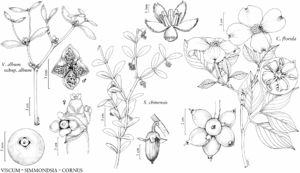Simmondsiaceae
Shrubs, evergreen, dioecious. Leaves opposite, simple; stipules absent; petiole present or absent; blade margins entire; venation pinnate. Inflorescences unisexual, axillary or terminal, glomerate cymes (staminate) or flowers usually solitary, rarely in 2–3-flowered clusters (pistillate). Flowers unisexual; perianth hypogynous; hypanthium absent; sepals (4–) 5 (–6), distinct; petals 0; nectary absent; stamens (8–) 10 (–12), distinct, free; anthers dehiscing by longitudinal slits; pistil 1, 3-carpellate; ovary superior, 3-locular, placentation apical-axile; ovule 1 per locule, apotropous; styles 3, distinct; stigmas 3. Fruits capsules, dehiscence loculicidal. Seeds 1 (–3) per fruit.
Distribution
sw United States, nw Mexico, in other regions
Discussion
Species 1.
The status of Simmondsiaceae has long been controversial; it has previously been included in the Euphorbiales, either submerged in Buxaceae or as a separate family near Buxaceae (A. Cronquist 1981), or in the Hamamelidae as its own order (A. L. Takhtajan 1997). Recent molecular phylogenetic evidence supports recognition as a monogeneric family with a near-basal position in the Caryophyllales (P. Cuénoud et al. 2002; K. W. Hilu et al. 2003; Angiosperm Phylogeny Group 2003; S. F. Brockington et al. 2009).
